初一否定句-一般疑问句和特殊疑问句讲解汇编
肯定句、否定句、一般疑问句和特殊疑问句的详解讲课讲稿

肯定句、否定句、一般疑问句和特殊疑问句的详解一、be动词:am, is, are二、肯定句、否定句、一般疑问句和特殊疑问句定义1.肯定句:表示肯定的意思, 即不含有否定词“不”。
比如:我是一个学生 I am a student.他去上学 He goes to school.2.否定句:表示否定的意思。
比如:我不是一个男孩。
I am not a boy他不去上学 He does not go to school.3. 一般疑问句:回答为“是yes”或者“否no”的问句。
比如:你是一个学生吗? Are you a student?你喜欢英语吗? Do you like English?特殊疑问句:以疑问词开头,对句中某一成分提问的句子叫特殊疑问句。
常用的疑问词有:what who whose which when where how why等。
特殊疑问句有两种语序:1.如疑问词作主语或主语的定语,即对主语或主语的定语提问,其语序是陈述句的语序:疑问词(+主语)+谓语动词+其他成分?如:who is singing in the room﹖whose bike is broken﹖2.如疑问词作其他成分,即对其他成分提问,其语序是:疑问词+一般疑问句语序?如:what class are you in﹖What does she look like﹖Where are you from﹖What time does he get up every morning﹖How do you know﹖特殊疑问词+助动词+主语+动词原形+其他?eg:Where do you do study English?特殊疑问词+be动词+主语+其他?eg:Why is your Mum so angry?特殊疑问词+情态动词+主语+动词原形+其他?eg:What can I do for you?注意:1.回答特殊疑问句时,不能用yes /no,即问什么答什么,尤其是简略回答。
中考初中英语肯定句、否定句、一般疑问句和特殊疑问句的讲解与练习.docx

中考初中英语肯定句、否定句、一般疑问句和特殊疑问句的讲解与练习肯定句、否定句、一般疑问句和特殊疑问句的讲解与练习一.句子的种类类别用法标点例句肯定叙述一件事情或This is a bag. That's my book.说明说话人的看法陈述句.I can’ t see a bag over 否定there.I don't know.Are you a student?一般用于提出问题?Do you like puppets?Can you speak English?What's your name?特殊用于提出问题?Where's my bag?疑问句How many trees are there?选择用于提出问题?Is your friend a boy or agirl?反意用于提出问题?It's a fine day, isn't it?祈使句表示命令或请求、建议.Put it here!或! Look at the noticeboard.表示惊讶赞美愤怒How smart!感叹句!Glad to see you!等强烈情感What a nice pencil case!一、 be 动词: am, is, are二、肯定句、否定句、一般疑问句和特殊疑问句定义1.肯定句:表示肯定的意思,即不含有否定词“不”。
比如:我是一个学生I am a student.他去上学He goes to school.2.否定句:表示否定的意思。
比如:我不是一个男孩。
I am not a boy.他不去上学He does not go to school.3.一般疑问句:回答为“是 yes”或者“否 no”的问句。
比如:你是一个学生吗?Are you a student?你喜欢英语吗?Do you like English?4.特殊疑句:回答不是“是yes”或者“否 no”的句,根据提内容具体回答。
初一否定句-一般疑问句和特殊疑问句讲解
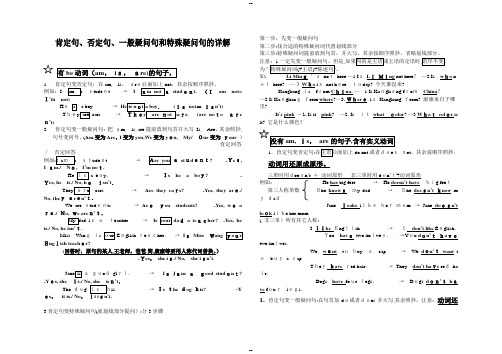
肯定句、否定句、一般疑问句和特殊疑问句的详解1.am, is , ar,其余按顺序照抄。
例如:I stude nt. → I stud ent. (I amnot=I’mnot)H e a boy. →not = isn ’t)T hecars. → rs. (are no t= are n’t)2. 肯定句变一般疑问句:把 am, is, are 提前放到句首并大写 Is, Are ,其余照抄,句号变问号。
(Am 变为Are ,I 变为you,We 变为y ou, My/ Our 变为 your )肯定回答/ 例如 stude nt. → a st ud ent? -Ye s,I am./ N t.He a b oy .→ Is he a bo y? -Yes, he is./ No, h e isn ’t . cars. → Are they ca rs? -Yes, they ar e./No, the yWe are stud ents. → Ar e you students? -Yes, w e a re./ No, we are n’t.i s a teacher. →da d a te acher? -Yes, he is./ No, he isn ’t. Miss Wan g is E nglish te acher . → I s Miss Wang Eng lish teach er? (回答时,原句的某人,王老师,爸爸,简,康康等要用人称代词替换。
)-Yes , she i s./ No, she i sn ’t. a goo d gi rl.→ I s J ane a good stud en t? -Y es, she in’t . The dog is . → Is the dog his? –Y es , it is./ No , it i sn ’t.3.肯定句变特殊疑问句(就划线部分提问):分3步骤第一步:先变一般疑问句第二步:找合适的特殊疑问词代替划线部分第三步:特殊疑问词提前放到句首,并大写,其余按顺序照抄,省略划线部分。
肯定句、否定句、 肯定句、否定句、一般疑问句和特殊疑问句的详解
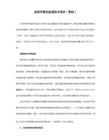
七年级英语上 否定句及一般疑问句知识点分析人教版
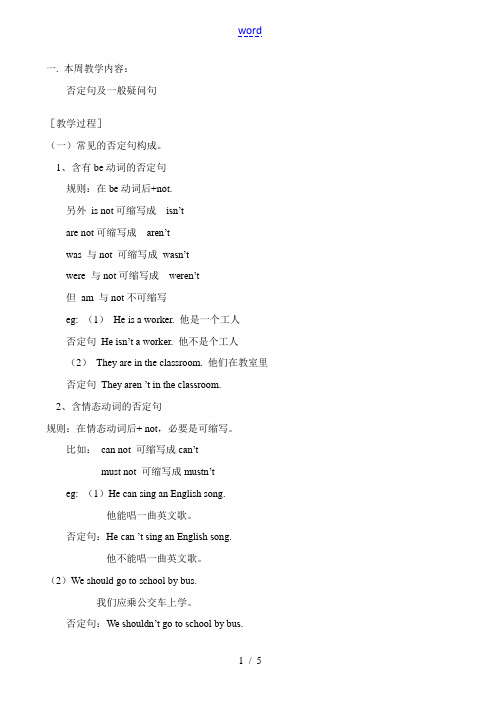
一. 本周教学内容:否定句及一般疑问句[教学过程](一)常见的否定句构成。
1、含有be动词的否定句规则:在be动词后+not.另外is not可缩写成isn’tare not可缩写成aren’twas 与not 可缩写成wasn’twere 与not可缩写成weren’t但am 与not不可缩写eg: (1)He is a worker. 他是一个工人否定句He isn’t a worker. 他不是个工人(2)They are in the classroom. 他们在教室里否定句They aren ’t in the classroom.2、含情态动词的否定句规则:在情态动词后+ not,必要是可缩写。
比如:can not 可缩写成can’tmust not 可缩写成mustn’teg: (1)He can sing an English song.他能唱一曲英文歌。
否定句:He can ’t sing an English song.他不能唱一曲英文歌。
(2)We should go to school by bus.我们应乘公交车上学。
否定句:We shouldn’t go to school by bus.我们不应乘公交车上学。
3、带有行为动词的句子的否定句构成(1)第三人称单数做主语。
(he、she、it或表示单个人或物的第三人称名词)规则:要在行为动词前加上助动词doesn’t,然后将动词恢复原形。
eg :He works in a school. 他在学校工作。
否定句:He doesn’t work in a school. 他不在学校工作。
(2)其它人称做主语规则:在行为动词前加don’t ,句子中的行为动词用原形。
eg: They like bananas.他们喜欢香蕉。
否定句:They don’t like bananas.注:(1)本节中讲到的行为动词否定句仅限于一般现在时(2)在变否定句时,如遇some应变anyThere are some books.There aren’t any books.(二)常见的一般疑问句变化1、含有be动词的句子变一般疑问句规则:把be动词提至句首,将原来的句号变成问号。
肯定句、否定句、肯定句、否定句、一般疑问句和特殊疑问句的详解

肯定句、否定句、肯定句、否定句、一般疑问句和特殊疑问句的详解一、be动词:am, is, are二、肯定句、否定句、一般疑问句和特殊疑问句定义1.肯定句:表示肯定的意思, 即不含有否定词“不”。
比如:我是一个学生 I a m a s tuden t. 他去上学 He goes to s chool. 2.否定句:表示否定的意思。
比如:我不是一个男孩。
I am n ot aboy 他不去上学He do es no t goto sc hool. 3. 一般疑问句:回答为“是 yes”或者“否no”的问句。
比如:你是一个学生吗?Are y ou astude nt? 你喜欢英语吗? Doyou l ike E nglis h? 特殊疑问句:以疑问词开头,对句中某一成分提问的句子叫特殊疑问句。
常用的疑问词有:特殊疑问句whatwho w hosewhich when wher e how why等。
特殊疑问句有两种语序:特殊疑问句有两种语序:1.如疑问词作主语或主语的定语,即对主语或主语的定语提问,其语序是陈述句的语序:疑问词(+主语)+谓语动词+其他成分?如:who i s sin gingin th e roo m? wh ose b ike i sbro ken?2.如疑问词作其他成分,即对其他成分提问,其语序是:疑问词+一般疑问句语序?如: what clas s are youin?W hat d oes s he lo ok li ke?W hereare y ou fr om?W hat t ime d oes h e get up e verymorni ng?H ow do youknow?特殊疑问词+助动词+主语+动词原形+其他?特殊疑问词+助动词+主语+动词原形+其他?eg:Wh ere d o you do s tudyEngli sh? 特殊疑问词+be 动词+主语+其他?特殊疑问词+b e 动词+主语+其他? eg:Why i s you r Mum so a ngry?特殊疑问词+情态动词+主语+动词原形+其他?特殊疑问词+情态动词+主语+动词原形+其他? eg:Whatcan Ido f or yo u? 注意:1.回答特殊疑问句时,不能用 yes/ no,即问什么答什么,尤其是简略回答。
肯定句、否定句、一般疑问句和特殊疑问句的讲解与练习
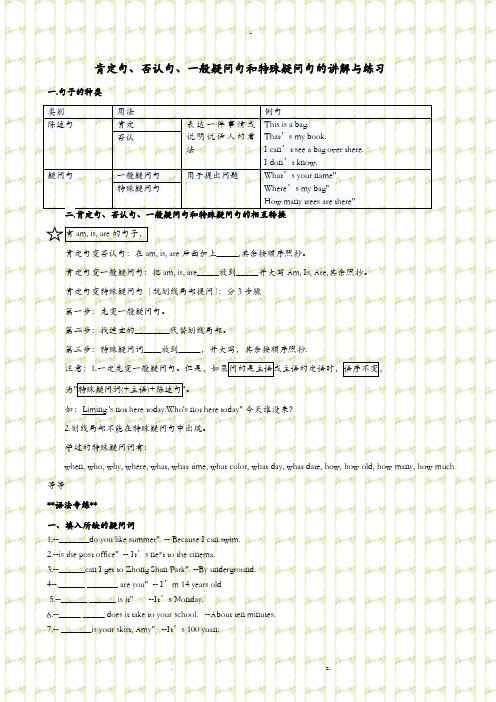
肯定句、否认句、一般疑问句和特殊疑问句的讲解与练习一.句子的种类类别用法例句陈述句肯定表达一件事情或说明说话人的看法This is a bag.That’s my book.I can’t see a bag over there.I don’t know.否认疑问句一般疑问句用于提出问题What’s your name"Where’s my bag"How many trees are there"特殊疑问句二.肯定句、否认句、一般疑问句和特殊疑问句的相互转换有am, is, are的句子,肯定句变否认句:在am, is, are后面加上_____,其余按顺序照抄。
肯定句变一般疑问句:把am, is, are_____放到_____并大写Am, Is, Are,其余照抄。
肯定句变特殊疑问句〔就划线局部提问〕:分3步骤第一步:先变一般疑问句。
第二步:找适宜的________代替划线局部。
第三步:特殊疑问词____放到_____,并大写,其余按顺序照抄.注意:1.一定先变一般疑问句。
但是,如果问的是主语或主语的定语时,语序不变,为"特殊疑问词(+主语)+陈述句"。
如:Liming 's not here today.Who's not here today" 今天谁没来?2.划线局部不能在特殊疑问句中出现。
学过的特殊疑问词有:when, who, why, where, what, what time, what color, what day, what date, how, how old, how many, how much 等等**语法专练**一、填入所缺的疑问词1.--_______do you like summer" -- Because I can swim.2.--is the post office" -- It’s ne*t to the cinema.3.--______can I get to Zhong Shan Park" --By underground.4--.______ _______ are you" -- I’m 14 years old5.--______ ______ is it" --It’s Monday.6.--_____ _____ does it take to your school. --About ten minutes.7.-- _______is your skirt, Amy" --It’s 100 yuan.8.--____ is today" --It’s February, fifth.二.句型转换1. There are 50 students in our class.否认句:______________________________________________一般疑问句:_______________________________________特殊疑问句:_______________________________________2. It takes Mike thirty minutes to go to school.一般疑问句:___________________________________________________否认句:_________________________________________________________3. I usually play football on Friday afternoon.否认句:__________________________________________________________一般疑问句:____________ __________________________________________就划线局部提问_______________________________ ____________________4. The book costs Mary ten yuan. 否认句:________________________________________________________一般疑问句:______________________________________________________ 划线提问:____________ ____________________________________________5. Today is February 5th, Tuesday. 否认句:____________ ______________________________________________ 一般疑问句:________________________________ ______________________ 划线提问_________________________________________________________ 6. Tom does his homework at home. 否认句:_______________________________________________________ ___ 一般疑问句:______________________________________________________ 划线提问_________ ________________________________________________7. Angela goes to school by subway.否认句:__________________________________________________________ 一般疑问句:__________ ____________________________________________ 划线提问_____________________________________ ____________________三.单项选择( )1.How many story books do you have "A.I have 10.B.I can see 10.C.Thirty yuan.( )2.Do you have new teachers"A.Yes,we do .B.Yes,we don’t.C.Yes,we have .( )3.Who’s your art teacher "A.Mr Zhu.B.Miss Zhu.C.He’s tall.( )4.What’s he like"A.He’s tall and strong .B.Yes,he is.C.Mr Zhu.( )5.Is your English teacher young"A.No,she isn’t.B.Yes,she is .C.No,she is.( )6. " Her name is Chen Jie.A.What’s your name "B.What’s she name "C.What’s her name "( )7. " I like Chinese,math and English.A.What classes do you like"B.What do you like"C.What are you like "( )8." It’s Monday.A.What is it today "B.What day is it today "C.What day is today "( ) 9. ______" It’s eight.A. What day is itB. What’s five and threeC. How old are youD. What’s your telephone number( ) 10. ______ is a ticker for the film Hacker He"-About forty yuan .A. How oldB. How manyC. How muchD. How often( )11. How are you "A.Fine,thanks.B.Yes,it is.C.How are you "( )12. How do you go to school "A.I go to Canada by plane.B.I go to school by bike.C.What about you "( )13. How do you go to the USA "A.I usually go to school by bus.B.I go to England by ship.C.I go by plane.Part B综合练习一.完型填空Linda is an English girl.She is twelve years old.She has two brothers. 1 are Jack and Jim. But she doesn’t 2 any sisters.Linda goes to school by 3 . She usually 4 to school at eight o’clock. The first class 5starts at nine o’clock.She has five classes every day. Her favorite 6 are math and science. She has math from Monday 7 Friday.On weekends, she 8 her brother with his homework at home. Sometimes she listens to music. She likes 9 very much. Her favorite musician is Liu Huan from China.She thinks his songs are very 10 .She likes them very much.( )1.A. We B. You C.They( )2.A. have B. know C. find( )3.A. radio B. bus C. watch( )4.A. leaves B. takes C. gets( ) 5.A. book B. class C. picture( )6.A.subjects B. clothes C. colors( ) 7.A. of B.at C. to( )8. A.asks B says C helps( )9. A.dancing B.singing C. running( )10. A.rela*ing B. boring C. difficult二.完成对话A: Hi, John.B: Hello, Kate, ___1___ is that girl over there"A: You mean the girl ___2___ red" She is my new classmate , Anne.B: Is she from England"A: No. She is from America. She is an ___3___.B: Why does she e ___4___ China"A: Her parents are working in China now.B: You mean the two foreign___5___ in our school"A: Yeah. She is ___6___ daughter.B: Does she ___7___ English"A: Of course.B: Maybe you can ___8___ her to help you ___9___ your English.A: How about her ____10____.B: She can only speak a little Chinese. So we can help each other.A: That sounds a good idea.三.五选五What means of transportation(交通工具) do you like"Alan I find it’s hard to answer this question. I fear (害怕) any kind of transportation, so it’s hard to choose (选择). If I have to, I’d choose the plane . 1 Becky I don’t like taking trains. There are always problems with trains. They’re often late. So I never take a train. 2Sally 3 Because I like traveling (旅行) by bicycle, by plane, by boat, by car ... But I like walking best. I enjoy walking.BobMy favorite way of traveling is my puter mouse (鼠标). 4 I can go around the world in a few minutes. 5A.I use my car and always get to the place that I want to go quickly.B.It is the fastest means of transportation.C.I can speak to people from all over the world, and look up (查阅) things quickly too.D.Answering this question is very difficult.E.It’s quick, rela*ing, and we can get food and drink on the it.1.________2.________3._______4._______5.________Part 3 listeningA.听句子〔共5小题,每题1分,共5分〕根据所听句子的内容和所提的问题,选择符合题意的图片答复下列问题,并将答案写在题前的括号内。
012019-2020学年七年级下学期英语期末一般疑问句否定句特殊疑问句讲解(上海牛津版)
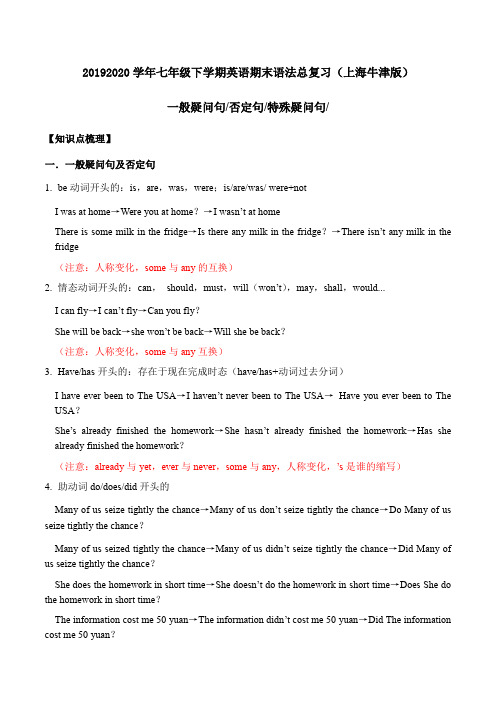
20192020学年七年级下学期英语期末语法总复习(上海牛津版)一般疑问句/否定句/特殊疑问句/【知识点梳理】一.一般疑问句及否定句1.be动词开头的:is,are,was,were;is/are/was/ were+notI was at home→Were you at home?→I wasn’t at homeThere is some milk in the fridge→Is there any milk in the fridge?→There isn’t any milk in the fridge(注意:人称变化,some与any的互换)2.情态动词开头的:can,should,must,will(won’t),may,shall,would...I can fly→I can’t fly→Can you fly?She will be back→she won’t be back→Will she be back?(注意:人称变化,some与any互换)3.Have/has开头的:存在于现在完成时态(have/has+动词过去分词)I have ever been to The USA→I haven’t never been to The USA→Have you ever been to The USA?She’s already finished the homework→She hasn’t already finished the homework→Has she already finished the homework?(注意:already与yet,ever与never,some与any,人称变化,’s是谁的缩写)4.助动词do/does/did开头的Many of us seize tightly the chance→Many of us don’t seize tightly the chance→Do Many of us seize tightly the chance?Many of us seized tightly the chance→Many of us didn’t seize tightly the chance→Did Many of us seize tightly the chance?She does the homework in short time→She doesn’t do the homework in short time→Does She do the homework in short time?The information cost me 50 yuan→The information didn’t cost me 50 yuan→Did The information cost me 50 yuan?(注意:some与any;cost,read,put,cut,set等动词的过去式)二.特殊疑问句1.对指物名词或谓语动词提出疑问,疑问词用what;关于what的其他疑问词:what color…That is my new Tshirt. →What is that?I am writing a piece of article. →What are you doing?The shirt is light yellow.→What color is the shirt?2.对修饰名词的定语提出疑问,疑问词应用which,而且通常和名词连用。
- 1、下载文档前请自行甄别文档内容的完整性,平台不提供额外的编辑、内容补充、找答案等附加服务。
- 2、"仅部分预览"的文档,不可在线预览部分如存在完整性等问题,可反馈申请退款(可完整预览的文档不适用该条件!)。
- 3、如文档侵犯您的权益,请联系客服反馈,我们会尽快为您处理(人工客服工作时间:9:00-18:30)。
肯定句、否定句、一般疑问句和特殊疑问句的详解有be 动词(am, is, are )的句子,1. 肯定句变否定句:在am, is, are 后面加上not,其余按顺序照抄。
例如:I am a student. → I am not a student. (I am not=I’m not) He is a boy. → He is not a boy. (is not= isn ’t) They are cars. → They are not cars. (are not= aren ’t)2. 肯定句变一般疑问句:把 am, is, are 提前放到句首并大写 Is, Are,其余照抄,句号变问号。
(Am 变为Are ,I 变为you ,We 变为you, My/ Our 变为 your ) 肯定回答 / 否定回答 例如:I am a student. → Are you a student? -Yes, I am./ No, I ’m not. He is a boy. → Is he a boy? -Yes, he is./ No, he isn ’t. They are cars. → Are they cars? -Yes, they are./ No, they aren ’t. We are students. → Are you students? -Yes, we are./ No, we aren ’t. My dad is a teacher. → Is your dad a teacher? -Yes, he is./ No, he isn ’t.Miss Wang is our English teacher. → Is Miss Wang your English teacher?(回答时,原句的某人,王老师,爸爸,简,康康等要用人称代词替换。
)-Yes, she is./ No, she isn ’t.Jane is a good girl. → Is Jane a good student? -Yes, she is./ No, she isn ’t. The dog is his. → Is the dog his? –Yes, it is./ No, it isn ’t. 3.肯定句变特殊疑问句(就划线部分提问):分3步骤第一步:先变一般疑问句 第二步:找合适的特殊疑问词代替划线部分第三步:特殊疑问词提前放到句首,并大写,其余按顺序照抄,省略划线部分。
注意:1.一定先变一般疑问句。
但是,如果问的是主语或主语的定语时,语序不变,为"特殊疑问词(+主语)+陈述句"。
如: Li Ming 's not here.—1.Is Li Ming not here? —2.Is who not here? —3.Who is nothere today? 今天谁没来?Kangkang is from China. — 1.Is Kangkang from China ? —2.Is Kangkang from where ?—3.Where is Kangkang from? 康康来自于哪里? It ’s pink . —1.Is it pink ? —2.Is it what color ? —3.What color is it? 它是什么颜色?没有am, is, are 的句子,含有实义动词1.肯定句变否定句:在主语后面加上do not 或者does not,其余按顺序照抄,动词用还原成原形。
三单时用doesn ’t + 动词原形 非三单时用don ’t+动词原形 例如: He has big feet. → He doesn ’t have big feet. 第三人称单数 She knows my dad. → She doesn ’t know my dad. Jane looks like her mom. → Jane doesn ’t look like her mom.( 非三单)所有其它人称: I like English. → I don ’t like English. You have two knives. →You don ’t have two knives. We want to buy a cap. → We don ’t want to buy a cap. They have red hair. → They don ’t have red hair. Dogs have four legs. → Dogs don ’t have four legs. 1. 肯定句变一般疑问句:在句首加do 或者does 并大写,其余照抄。
注意:动词还原成原形。
三单时借助Does 放句首,句中动词还原为原形 非三单时借助Do 放句首 例如: He has big feet. → -Does he have big feet? ( 肯定回答 / 否定回答:) -Yes, he does./ No, he doesn ’t. She knows my dad. → -Does she know your father ?-Yes, she does./ No, she doesn ’t. 第三人称单数 Jane looks like her mom. → -Does Jane look like her mom?-Yes, she does./ No, she doesn ’t. The cat likes fish . → -Does the cat like fish?-Yes, it does./ No, it doesn ’t. The girl gives a letter to her. → -Does the teacher give a letter to her?- Yes, she does./ No, she doesn ’t. ( 非三单) 所有其它人称: 肯定回答 / 否定回答I like English. → Do you like English? -Yes, I do./ No, I don ’t. You have two knives. → Do you have two knives? -Yes, we do./ No, we don ’t. We want to buy a cap. → Do you want to buy a cap? -Yes, we do./ No, we don ’t.They have red hair. →Do they have red hair? -Yes, they do./ No, they don’t. Dogs have four legs. →Do dogs have four legs? -Yes, they do./ No, they don’t. Lucy and Lily have big eyes.→-Do Lucy and Lily have big eyes? -Yes, they do./ No, they don’t. The men want to buy shoes.→-Do the men want to buy shoes? -Yes, they do./ No, they don’t.2.肯定句变特殊疑问句(就划线部分提问):分3步骤第一步:先变一般疑问句第二步:找合适的特殊疑问词代替划线部分第三步:特殊疑问词提前放到句首,并大写,其余按顺序照抄,省略划线部分。
注意:1.一定先变一般疑问句。
但是,如果问的是主语或主语的定语时,语序不变,为"特殊疑问词(+主语)+陈述句"。
2.划线部分不能在特殊疑问句中出现。
非三单时用do, 三单时用does非三单肯定句:I like English.一般疑问句:Do you like English? 否定句:I do not like English.三单肯定句:He likes English.一般疑问句:Does he like English?否定句:He does not like English.就划线部分提问:I like English.第一步:先变一般疑问句Do you like English?第二步:找合适的特殊疑问词代替划线部分Do you like what?第三步:特殊疑问词提前放到句首,并大写,其余按顺序照抄,省略划线部分。
What do you like?有情态动词的句子:can, will等肯定句变否定句:在can,will后面加上not,其余按顺序照抄。
肯定句变一般疑问句:把can,will提前放到句首并大写,其余照抄。
肯定句变特殊疑问句(就划线部分提问):分3步骤第一步:先变一般疑问句第二步:找合适的特殊疑问词代替划线部分第三步:特殊疑问词提前放到句首,并大写,其余按顺序照抄,省略划线部分。
1)He can sing an English song.A:否定:He can not sing an English song.B: 一般疑问:Can he sing an English song?肯定回答,否定回答-Yes, he can./ No, he can’t.C: 特殊疑问句:What can he sing? 2)I will give the letter to her.否定:I will not give the letter to her.一般疑问:Will you give the letter to her? Yes, I will./ No, I won’t.特殊疑问句:Who will give the letter to her?3) I can spell it.否定:I can’t spell it .一般疑问:Can you spell it? Yes, I can./ No, I can’t.特殊疑问句:What can you spell?特殊疑问词的用法意思用法例句what什么问人的职业或事物是什么He is a worker. What is he?He has a book. What does he have ?which 哪一个问一定范围内特指的人或物The big box is mine. Which box is yours?The girl at the door is Ann. Which girl is Ann?whose 谁的问所属关系This is her book. Whose book is this ?This book is hers. Whose is this book?what color 什么颜色问颜色My skirt is red. What color is your skirt?Whatclass/grade哪个班、年级问班、年级I’m in Class5,Grade7. What class are you in?She’s in Grade 9. What grade is she in? who 谁问是哪个人He is Michael. Who is he?The girl in red is Maria. Who is Maria? where 什么地方问地点(状语)I am from Canada. Where are you from?He comes from Hunan. Where does he comefrom?how 怎样问健康状况、做事的方式等He is fine/strong. How is he ?I go home by bike. How do you go home?how old 多大几岁问年龄He is ten. How old is he ? 询问长相:What does…look like? 某人长什么样子?。
